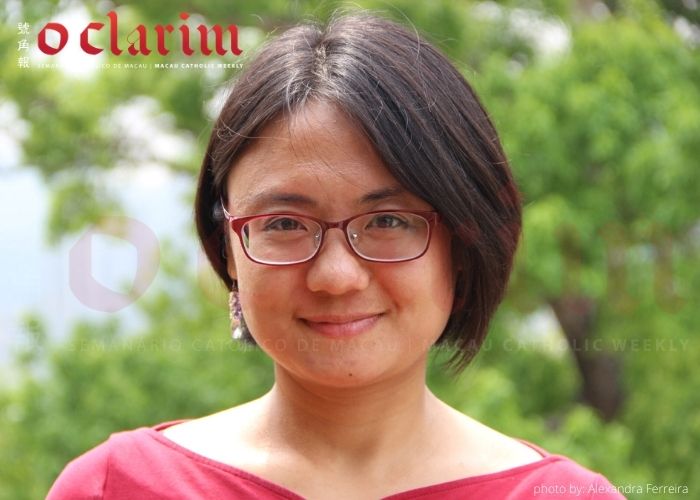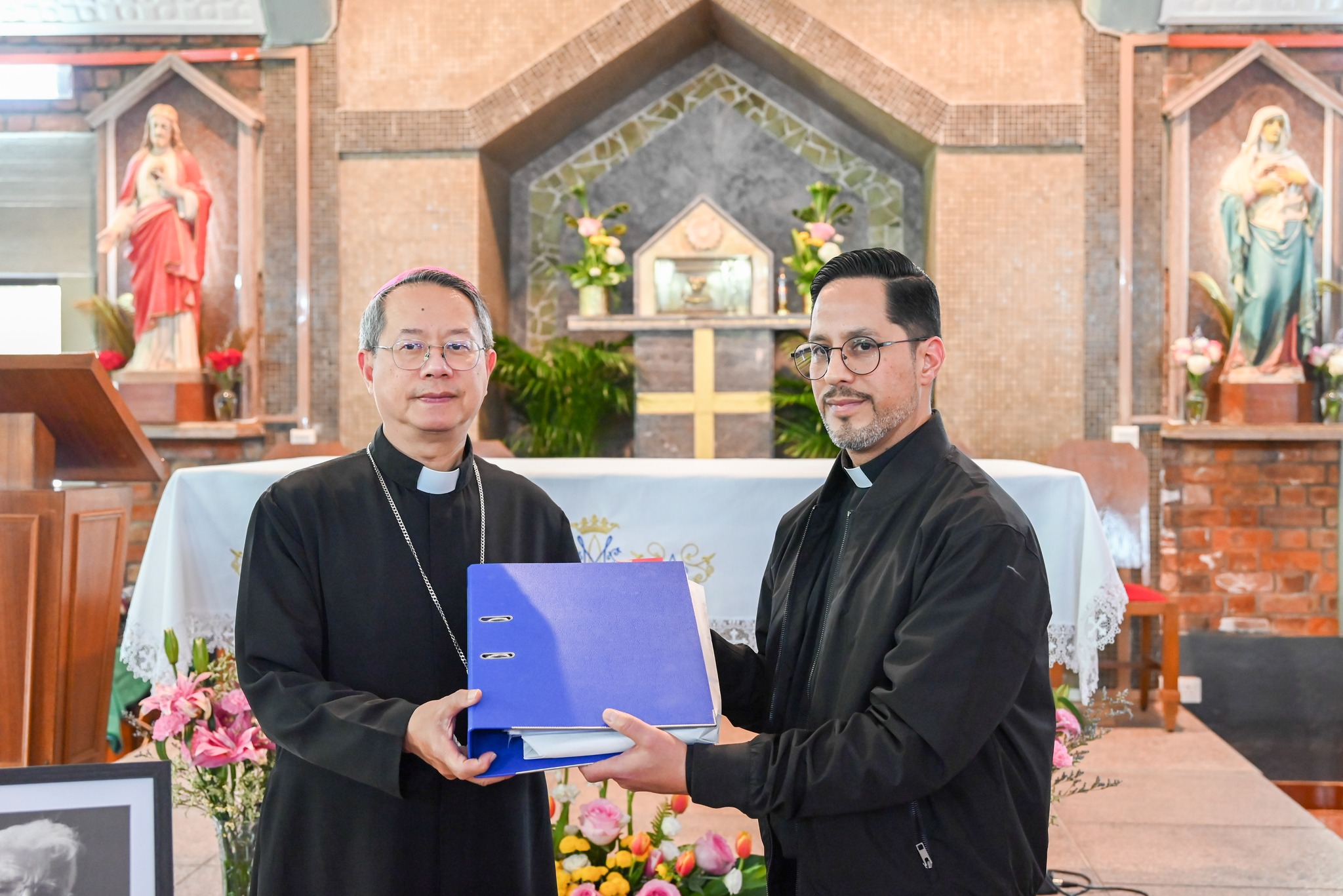SONJA XIA, PROFESSOR AT THE FACULTY OF RELIGIOUS STUDIES AND PHILOSOPHY – “Society expects women to act as men”
Marco Carvalho
Even without being ordained, women can make a decisive contribution to the life of the Church, Sonja Xia claims. With a PhD in Theology from the Catholic University of Leuven, the educator at the University of Saint Joseph believes that the Church and society will still follow different paths as long as women continue to be seen under the same light as men. Sonja Xia, professor at the Faculty of Religious Studies and Philosophy at USJ, about the role of women in modern society.
In February, Pope Francis appointed French Sister Nathalie Becquart to the post of undersecretary of the Synod of Bishops, one of the most important bodies in the Church’s hierarchy. A month earlier, in January, the Holy See recognized the contribution women had been making for decades to the daily life of the Church, both as readers and as Eucharistic Ministers. Is the way women are seen within the Catholic Church changing? To what extent are these changes inevitable?
Well, I am a Professor here. In a way, I am already a part of that movement of empowerment of women because, as a girl, I could not imagine that a woman could be a Professor in a Faculty such as this. Nevertheless, in my opinion, it is all happening not necessarily because the Church is changing or there was a sudden enlightenment about how important women are, but it’s more about the course of human history. We are living in a different context. If a woman can be a teacher here and see her career as an important part of her life, it is just because there was a movement for women to have independence or, at least, for women to have more equality. But before that, the aspect of human history that made this all possible is the liberation of women from housework. It is not that we cherish women more now. It is about a technical improvement in society that helped to liberate women from doing housework, so that we can have time to study, to have a career or pursue a more accomplished life. This is something that makes modern society different, makes it seem that we can have equal opportunities with men. On the other side, what really does it mean to have a role, a professorship here, in this University, or something similar? Does it mean that a woman should be able to do the work that men do? If so, that doesn’t mean that women conquered equality. What if this equality, especially in the Church, goes back to the essence of the Trinity, of God’s being one God in three Persons? The key message is that Trinity sets a prototype for our relationship with the world and what is to live in a world that is so diverse. We need to recognize that diversity and the uniqueness of each person. The first diversity that God gave the world is that God created us man and woman. Man and woman are different, they have different characters. They can contribute to the world, to human society and, eventually, to our salvation in different ways.
How do those differences in character affect or reflect themselves on the daily life of the Church?
We have to have in mind what sort of traits prevail in women’s character and what sort of contribution we can make. It is not really about what work we can do. Being a professor here, it is not really about being a woman or being a man, we are all doing the same job – teaching and investigating. Equality means that, as a female, teaching in a Faculty like this, I teach in a different style, I relate to students in a different way. The fact that I am a woman, that I am different from a man, and that, and my female character, is that I have to offer. For me equality is more important if, as a professional, my unique contribution can be recognized. It is not to have the same conditions exactly as men. Even though I got this Professorship in the University of Saint Joseph, I am not really contributing as a female unless my special character, my special features or my special values are recognized and welcomed. Throughout Church history we can see a lot of women actually exerting a great influence. This was very visible during the Reformation Period, the counter-reformation period. Teresa of Avila gave us a very distinct position on religious life. These things happened a lot in the early Church, when women really had an active voice, not because they were officially empowered by any decision making positions, but they were empowered in a different way; they were seen as more spiritual, they worked in communities, where sometimes they were seen as leaders and, in that way, they exerted a lot of influence as well. Origen, one of the early Church Fathers, wrote a book on his elder sister’s ascetic life and that book came to be read by a lot of Church Fathers decades later. Seen in a different light, women have always been empowered by the Church.
Society, however, seems to demand more…
If we look at modern secular society, women are seen under the prototype of what a man can do. Men can work in the office, men can be in the army, but women cannot, so [it seems] women are not empowered. But it is not like that. A woman working at home, working in the family, is also empowered. She is making a different contribution to society herself. Women have to be judged as women. I think that one of the most important things in the Church is that we have to have in mind that, in the beginning God created man and woman. Later, when we have the Incarnation, God didn’t jump directly to earth as a man. He chose to reveal himself through a woman and in that way, actually, he invited women into the key process of salvation. In this way, God is sending a key message that women as women, invested with the magic power of giving birth, with their motherly nature, their unique capacity to take care of a baby, are giving a very important contribution to the process of salvation. So, regarding the changes in the Church, in a certain sense, they were brought by the context. On the other hand, I think that, nevertheless, this is also a gesture showing that the Church is constantly thinking about the value of women, about how we can recognize women, how we can treasure women.It shows that valuing women is in the very essence of the Church, it was always within its tradition and I see this process as a continuation of this tradition. Secular society, in the name of giving women more power, expects women to be men, to behave as men. Actually, there is a very specific beauty in diversity and by acting like this, society is cancelling that diversity. I would say that to empower women is to recognize women as women.
You were saying that women can contribute with a sort of different sensibility to the life of the Church. Nevertheless, we witness, in different parts of the world, a real problem which is the lack of vocations. We have this problem in Europe, for instance. We have this problem in South America. It was mentioned during the Amazon Synod, where there was even a debate about the possibility of allowing women to do something more. Do you believe that this might happen? Do you believe that women might be ordained in the foreseeable future?
Well, if we look at the Church’s history, from the beginning of the Church until now, it is very clear that this question of priesthood, the key to it, is not really related to whether we are or not able to play a major role in the Mass. It is related to the idea of Apostolic Succession. Jesus chose some apostles and then they elected their own successors. What do we find at the core of this process? We find that the Apostles and the apostles were men. Again, going back to God’s plan for salvation and incarnation, women have a role to play and it is not as Jesus or as his successor. Women could be more like Mary. Mary, of course, is not God, but she has the most important role in the Church and her role continues to be cherished by the Church itself. We can never stress her importance too much. The lack of priests, the lack of vocations can be related to many, many factors. It is a problem that we cannot solve by calling on women.


 Follow
Follow


